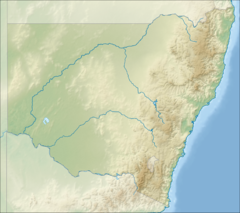Point Stephens Light

Point Stephens Lighthouse
|
|
|
New South Wales
|
|
| Location |
Point Stephens New South Wales Australia |
|---|---|
| Coordinates | 32°44′48.95″S 152°12′4.16″E / 32.7469306°S 152.2011556°ECoordinates: 32°44′48.95″S 152°12′4.16″E / 32.7469306°S 152.2011556°E |
| Year first constructed | 1862 |
| Automated | 1973 |
| Construction | sandstone tower |
| Tower shape | cylindrical tower with balcony and lantern |
| Markings / pattern | white tower and lantern |
| Height | 70 feet (21 m) |
| Focal height | 126 feet (38 m) |
| Light source | solar power |
| Intensity | 40,700 cd |
| Range | 17 nautical miles (31 km) |
| Characteristic | Fl (4) W 30s. |
| Admiralty number | K2770 |
| NGA number | 111-6052 |
| ARLHS number | AUS-138 |
| Managing agent | Australian Maritime Safety Authority |
Point Stephens Light is an active lighthouse located on Point Stephens, a point on an unnamed headland at the east of Fingal Bay, 4.25 km (2.64 mi) south of the entrance of Port Stephens, New South Wales, Australia. It serves in assisting vessels entering Port Stephens. It is considered an endangered lighthouse due to remote location and old age.
Proposed in 1857, the lighthouse was built in 1862. Designed by Alexander Dawson, the New South Wales Government Architect at that time, both the lighthouse's flared base and the keeper's cottages combined terrace are unique architectural features for the period. The light source used was originally kerosene lamps, which upgraded in 1912 to a Dalén light, upgraded again to electric light in 1960, automated in 1973, and finally converted to solar power in 1990. In 1991 the last caretaker withdrew from the premises and very soon after the keeper's cottages were vandalised and burned.
The tower is designed in the form of a Doric column. It is divided into four stories with a spiral stairway, and topped by a gallery carrying the lantern. The keeper's cottages are three one story cottages, sharing a roof. Other structures which still stand at the location are a circa 1930 privy and workshop built in the 1950s.
The lighthouse is managed as part of the Tomaree National Park. Access to the lighthouse is difficult, either through a narrow spit of sand at low tide or by boat.
As early as 1857, the need for a lighthouse on Point Stephens was identified, due to the proximity to the entrance of Port Stephens, and the dangers of the local coastline to ships. Another reason was that mariners were mistaking the entrance to Fingal Bay for that of Port Stephens. At least twenty four vessels are known to have been wrecked in the area. the most serious being the Dove in 1828 with the loss of seven lives, and the Pandora in 1836 with five lives. Another notable wreck was the Florence Irving in 1877.
...
Wikipedia

